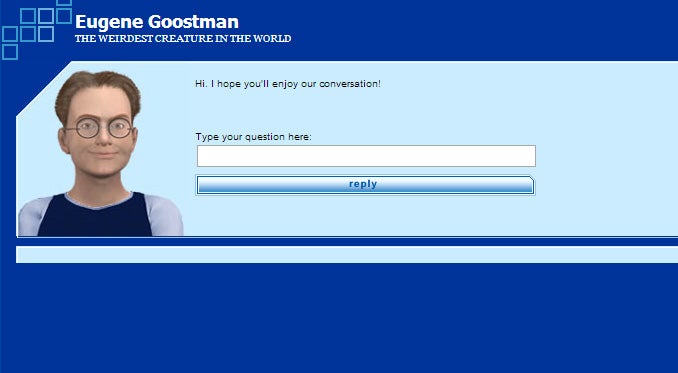Turing Test breakthrough as super-computer becomes first to convince us it's human
Eugene Goostman, a computer programme pretending to be a young Ukrainian boy, successfully duped enough humans to pass the iconic test

Your support helps us to tell the story
This election is still a dead heat, according to most polls. In a fight with such wafer-thin margins, we need reporters on the ground talking to the people Trump and Harris are courting. Your support allows us to keep sending journalists to the story.
The Independent is trusted by 27 million Americans from across the entire political spectrum every month. Unlike many other quality news outlets, we choose not to lock you out of our reporting and analysis with paywalls. But quality journalism must still be paid for.
Help us keep bring these critical stories to light. Your support makes all the difference.
A programme that convinced humans that it was a 13-year-old boy has become the first computer ever to pass the Turing Test. The test — which requires that computers are indistinguishable from humans — is considered a landmark in the development of artificial intelligence, but academics have warned that the technology could be used for cybercrime.
Computing pioneer Alan Turing said that a computer could be understood to be thinking if it passed the test, which requires that a computer dupes 30 per cent of human interrogators in five-minute text conversations.
Eugene Goostman, a computer programme made by a team based in Russia, succeeded in a test conducted at the Royal Society in London. It convinced 33 per cent of the judges that it was human, said academics at the University of Reading, which organised the test.
It is thought to be the first computer to pass the iconic test. Though other programmes have claimed successes, those included set topics or questions in advance.
A version of the computer programme, which was created in 2001, is hosted online for anyone talk to. (“I feel about beating the turing test in quite convenient way. Nothing original,” said Goostman, when asked how he felt after his success.)
The computer programme claims to be a 13-year-old boy from Odessa in Ukraine.
"Our main idea was that he can claim that he knows anything, but his age also makes it perfectly reasonable that he doesn't know everything," said Vladimir Veselov, one of the creators of the programme. "We spent a lot of time developing a character with a believable personality."
The programme's success is likely to prompt some concerns about the future of computing, said Kevin Warwick, a visiting professor at the University of Reading and deputy vice-chancellor for research at Coventry University.
"In the field of Artificial Intelligence there is no more iconic and controversial milestone than the Turing Test, when a computer convinces a sufficient number of interrogators into believing that it is not a machine but rather is a human," he said. "Having a computer that can trick a human into thinking that someone, or even something, is a person we trust is a wake-up call to cybercrime.
"The Turing Test is a vital tool for combatting that threat. It is important to understand more fully how online, real-time communication of this type can influence an individual human in such a way that they are fooled into believing something is true... when in fact it is not."
The test, organised at the Royal Society on Saturday, featured five programmes in total. Judges included Robert Llewellyn, who played robot Kryten in Red Dwarf, and Lord Sharkey, who led the successful campaign for Alan Turing's posthumous pardon last year.
Alan Turing created the test in a 1950 paper, 'Computing Machinery and Intelligence'. In it, he said that because 'thinking' was difficult to define, what matters is whether a computer could imitate a real human being. It has since become a key part of the philosophy of artificial intelligence.
The success came on the 60th anniversary of Turing's death, on Saturday.
Join our commenting forum
Join thought-provoking conversations, follow other Independent readers and see their replies
Comments